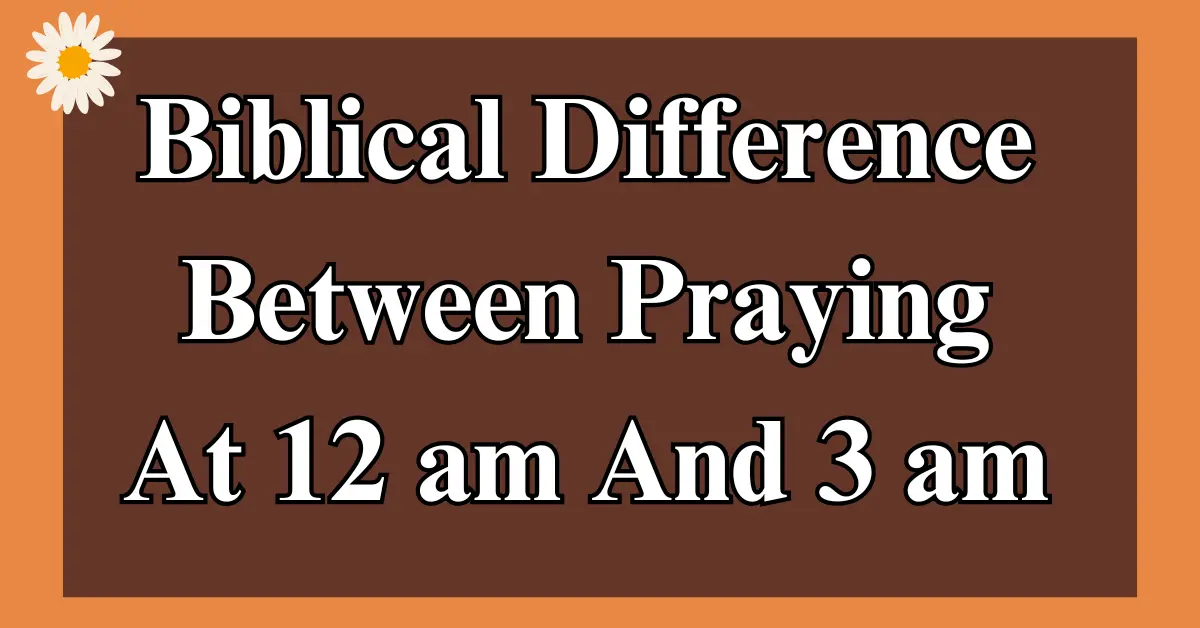Discover the Biblical difference between praying at 12 am and 3 am and unlock the spiritual power behind these sacred hours. Whether you’re seeking God’s guidance, peace, or a deeper connection with Him, each time carries unique significance for believers. Start your prayer journey today to experience the comfort and provision promised in the Bible!
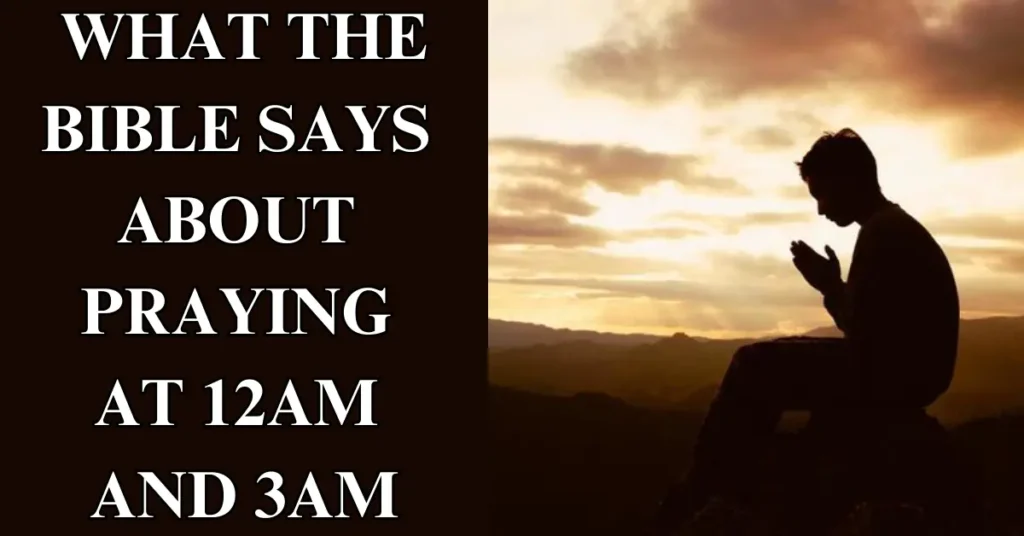
Table of Contents
Difference Between Praying At 12am And 3am
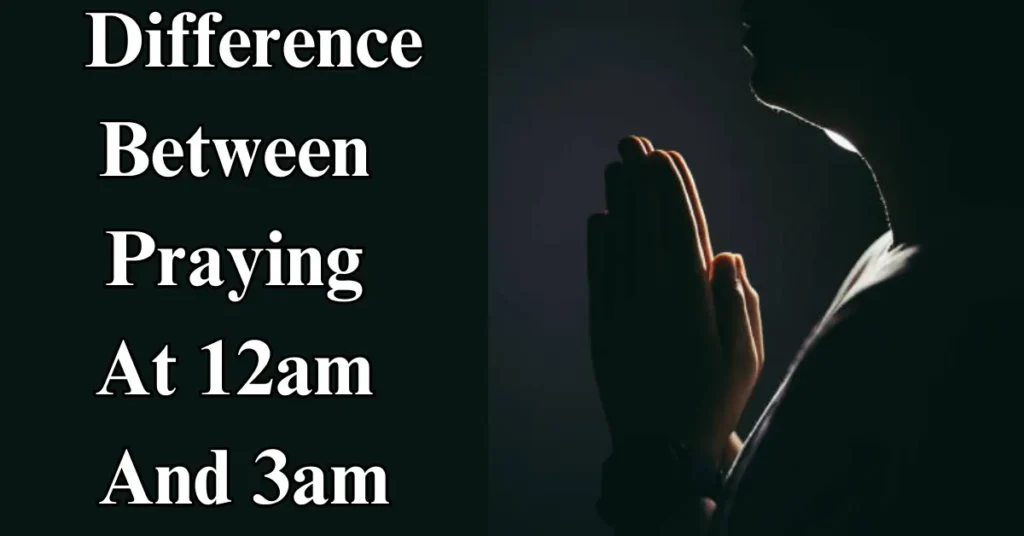
In Christianity, prayer is a vital act that strengthens a believer’s relationship with God, as the Bible consistently teaches. Praying at 12am holds profound significance, often associated with spiritual battles and breakthroughs.
Moments like Paul and Silas singing hymns at midnight in Acts demonstrate the power of midnight prayers, leading to miraculous deliverance. It is a time to seek guidance, confess sins, and call on the intervention of Jesus, as urged in Luke 18:1.
By contrast, praying at 3am focuses on finding peace, releasing anxieties, and meditating in God’s presence. This time reflects the early morning solitude seen in King David’s prayers in Psalms and Jesus’ practice in Mark 1:35. Verses like Philippians 4:6-7 and 1 Peter 5:7 encourage believers to trust God during this sacred hour, making it ideal for personal reflection and heartfelt communication with Him.
Having personally prayed during these hours, I’ve experienced the unique benefits each time offers. Midnight prayers helped me overcome spiritual struggles, while early morning prayers brought a deep sense of peace and clarity. These moments, filled with sincere faith, have shown me the power of God’s presence, as beautifully expressed in Psalm 139:7-12.
Praying At 3am In The Morning
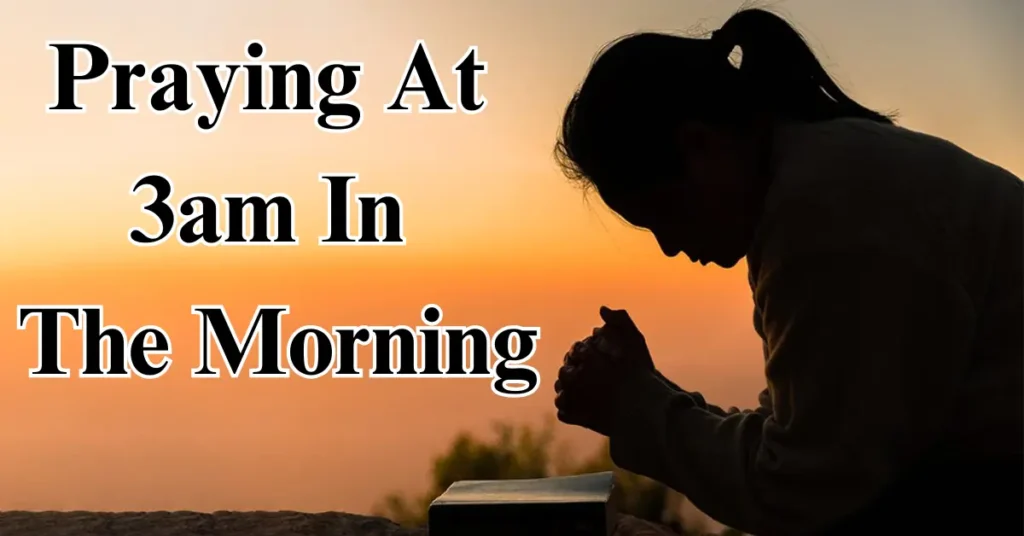
Here are the key points about Praying at 3am in the Morning:
- Praying at 3 a.m. holds deep significance for Christians, representing a personal time for spiritual practices. While the Bible does not give direct instruction on this particular hour, many believers ascribe importance to it, drawing from specific experiences and biblical arguments that support the practice.
- The symbolism of praying at 3 a.m. reflects spiritual vigilance and anticipation. This hour is linked to the fourth watch of the night, as seen in Matthew 14:25, representing the darkest period before dawn. It is a significant time, demonstrating deeper commitment in seeking God and aligning one’s purposes with His.
- Emulating Jesus, who rose early in the morning to pray and commune with the Father (Mark 1:35), many Christians choose to follow His example, dedicating early hours to seek and connect with God. This practice fosters spiritual discipline and aligns their hearts with His will.
- The quietude of 3 a.m. offers a unique focus that the daytime hours often lack. It’s one of the quietest and least distracted times, providing a perfect atmosphere for stillness, solitude, and deeper connection with God.
- Praying at 3 a.m. is also a powerful time for spiritual warfare and intercession. It holds significance for engaging in opposition, seeking protection, and interceding on behalf of others, as this period is seen as a time of spiritual action in the late-night and early-morning hours.
- Many Christians find value in praying at 3 a.m., regardless of the specific hour. The effectiveness of this time is rooted in the heart, sincerity, and faith of the individual, reinforcing the notion that any time spent in prayer can bring spiritual growth and alignment with God’s will.
Having experienced the stillness and clarity of praying during these hours, I’ve found that 3 a.m. offers a deeper sense of connection with God. The quiet allows me to focus on my heart’s desires and connect with His will.
What Does The Bible Say About Praying At 3am
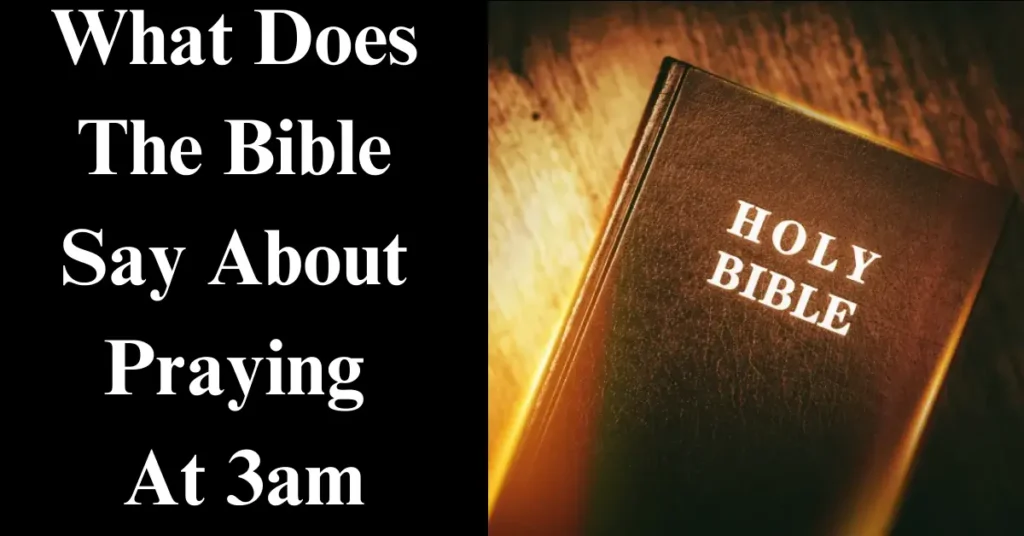
Here are the key points about What the Bible Says About Praying at 3am:
Praying at Midnight:
In the Bible, praying at midnight holds significance and symbolism in both the Old Testament and the New Testament. In Exodus 12:29-31, the Israelites were delivered from slavery in Egypt during the midnight hour. Similarly, Paul and Silas prayed and sang hymns at midnight while imprisoned, leading to a miraculous release in Acts 16:25-26. This time is often linked to divine intervention, deliverance, and breakthrough, as Christians seek God’s power during the midnight hour.
Personally, I’ve had moments when praying late at night brought sudden peace and clarity, especially during challenging situations. There’s a certain spiritual strength that comes from seeking God in the stillness of midnight.
Praying at the “Third Watch” (3 a.m.):
The concept of the third watch, referring to praying at 3 a.m., is rooted in the ancient practice of dividing the night into four specific time intervals. The third watch, occurring around 3 a.m., is often associated with heightened spiritual activity and the presence of God, creating a time when deeper experiences and revelations can be felt more intensely. Christians may find this time significant for communion with God, seeking His guidance and wisdom.
I’ve noticed that 3 a.m. feels like a sacred time for reflection and deeper spiritual connection. Praying during this hour often brings a sense of closeness to God, as if His presence is more tangible during these quiet, early hours.
Biblical Examples of Nighttime Prayer:
Nighttime prayer is explicitly referenced in the Bible, including 12 a.m. and 3 a.m. In Psalm 63:6, King David speaks of seeking intimacy with God during the night, while Jesus, in Mark 1:35, rose early in the morning to pray in solitude, demonstrating the importance of specific times for communion with the Father. These examples show the importance of making time for prayer and seeking God, no matter the hour.
Reflecting on these biblical examples, I’ve found that incorporating early morning or nighttime prayer in my own life has allowed me to experience greater intimacy with God. There’s something about these quiet moments that deepen my connection and open my heart to His guidance.
Effectiveness of Prayer:
The effectiveness of prayer is not defined by the time chosen but by the sincerity, faith, and alignment with God’s will. 1 Thessalonians 5:17 encourages believers to pray without ceasing, and Jeremiah 33:3 assures that God will hear and answer prayers made from a genuine heart. Whether at 3 a.m. or any other time, Christians are urged to approach prayer with a sincere and faithful heart, knowing that God is always available to listen.
I’ve come to realize that no matter the hour, prayer is most effective when done with a genuine heart. The times I’ve prayed with deep sincerity, whether at 3 a.m. or in the middle of the day, have led to some of the most profound spiritual breakthroughs.
Conclusion
Understanding the biblical difference between praying at 12 am and 3 am unlocks the unique spiritual significance each time holds for believers. Whether it’s the powerful midnight prayers associated with divine breakthroughs or the tranquil 3 a.m. moments of reflection and communion, both times serve to deepen our connection with God. These sacred hours offer opportunities to seek guidance, align with His will, and experience spiritual growth. Embrace these times of prayer to discover the peace and spiritual clarity promised in the Bible.
FAQs
Why is praying at midnight important?
Midnight (between 12:00am – 3:00am) is known to be the most spiritually active period of the day. You will notice that dreams, revelations, attacks, visitations from the spirit world (both by angels and demonic powers) often come at this time, especially when you are sleeping.
How powerful is night prayer?
Nightly prayers also help you reflect on all the ways that God has been present with you. No matter what you faced today, talking to God through a night prayer will renew your faith and help you experience a night of better sleep.
